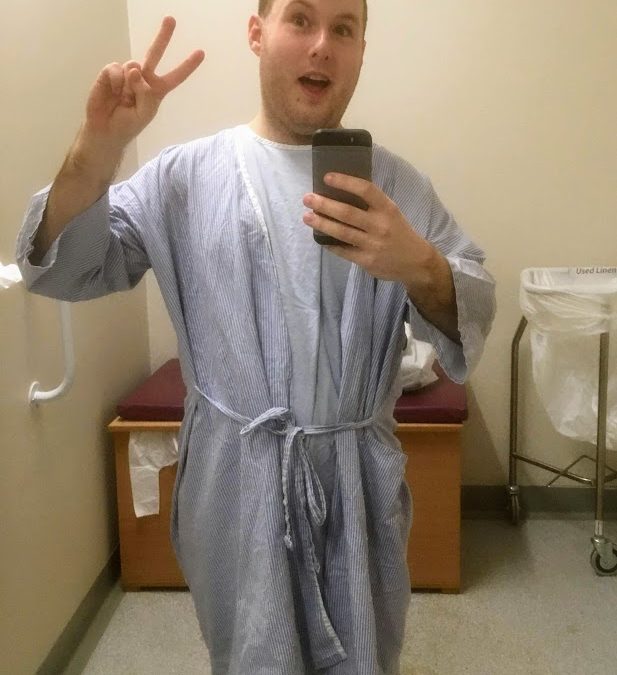I’m Jack Posnett, I’m 22 and I have axial spondyloarthritis. I never thought I’d want to openly talk about my own experience with arthritis. I was happy enough reading and being inspired by other people’s journeys, the challenges they face and what they do to overcome them. I was also afraid that telling my story would make it all more real. I am fully aware of my situation, but there are things that I keep bottled up and to talk about them scares me. However, I would like to be able to help people in the way that other people have helped me, and I think the best way to do that now is to open up and be honest. Every case is different and everyone manages theirs differently. I think the more we talk about it, the more advice there is for newly diagnosed people who don’t understand why their body is betraying them.
At the age of 19 I developed and was diagnosed with axial spondyloarthritis (axial SpA). I managed to get diagnosed fairly quickly, but it was not obvious in the beginning. I woke up one morning, had a golf ball like swelling on the back of my left foot and could not walk around without limping. I went to my GP who told me I had Achilles tendonitis. It persisted, I went to a foot specialist and long story short I underwent some shockwave therapy on my heel. This involved using a tiny jackhammer like device on my heel that was supposed to re-injure the tendon to stimulate healing (or something along those lines, this was a while ago now and I am not a medical professional). So, a few of these sessions and some physiotherapy later and my limp was gone. Things were looking up.
However, things soon took a turn for the worse. Not only did my limp return, I developed constant pain in my legs, feet, shoulders, neck and back. I became very weak, was tired all the time and lost a lot of mobility. The diagnosis was axial spondyloarthritis. This is an inflammatory form of spinal arthritis, but it can affect the entire body. The inflammation is caused, as I understand, by my immune system going overboard and so basically my body is attacking itself. At my worst; I had been through a range of anti-inflammatory tablets that weren’t doing anything to help, I could barely walk a few hundred yards at a time and I could not stand up straight out of a chair properly. Sleeping was difficult due to the pain and when the sun came up getting out of bed was a struggle because of morning stiffness.
At this point I’ve talked about the pain and some of the physical impacts. Axial SpA is unfortunately a lot more than that. It is life altering and it affects your mental health as well as physical. Before my arthritis developed, I was in a pretty good place and was happy with my development and who I was as a person. I was confident, independent and physically active. My main hobbies were tap dancing and trampolining. Trampolining played a huge part of my life for twelve years and I had coaching and judging qualifications. At the time it developed I was on a gap year which involved working part time at a pub in my home town which I really enjoyed and I was due to head off to University September 2016. However, as things got progressively worse, I lost more and more of myself. I had to quit work, due to how the tendons in my feet are affected I can’t go back to trampolining without getting my limp back and I came to rely on my parents more than I wanted to. My confidence was shot and replaced with fear and I just lost all sense of self. I didn’t know what I was going to do or whether I’d make it to University. I’ll never forget the moment I was in so much pain I cried to my parents just begging to be a “normal person” again. I was anxious, depressed and I felt broken. I am ashamed to say that for a time I turned to alcohol to cope because my anti-inflammatory tablets weren’t working and when I was drunk there was no pain and I could move around easier.
Please drink responsibly, don’t use alcohol as a coping mechanism. It definitely creates more problems than you think it solves.
One day I got a letter in the post saying I had an appointment at a hospital I didn’t know with a doctor whose name I didn’t recognise. I didn’t think much of it. I was in and out of GP appointments and thought I had just been referred to be told the same things I had been told a billion times only by someone else. It wasn’t until I got there that my mum told me that she and my dad had been writing to doctors in search of treatment for me and that my name had been passed to the doctor I was about to see. He was specialist in arthritis and involved in drug trials. So, I met him, we talked trials and I was eligible for one. The trial started in January of 2017. I started University in September 2016. My first semester was hell; the pain and fatigue were getting worse, I slept a lot and I was very stuck in my shell, but I pushed through, did my work and managed to make friends and socialise a bit, because I knew I just had to make it to January and things would start to get better. When the trial started things turned around. Within five weeks I lost my limp and could move around a lot better. I could keep up. I came out of my shell and got to know people better.
There were still down times every now and then, but they were nothing compared to the lowest points before the trial and I made it through my degree to graduate July 2019.
As I write this it’s nearly 2020, by which point I will have been on the trial for roughly three years. The trial ends in 2021, but I should still receive the drug after. The point of the trial is to get it licensed for use in axial SpA cases and to make it easily accessible to sufferers. The drug is an immunosuppressant that is designed to stop my immune system from going crazy (very medical term) and causing inflammation. I inject this into myself once a month as well as taking a weaker anti-inflammatory tablet daily for extra support, although I believe I’ll reach a point where I won’t need tablets. Despite being immunosuppressed, I do not feel that I get ill more than anyone else. I am not in constant pain anymore, but fatigue can still be an issue, my physical strength changes a lot and I’ll still never bounce again; I can deal a lot better with those though compared to the pain I used to be in.
The trial has stopped the pain and given me my mobility back. For the most part I am physically quite healthy. However, I feel that I still have a long way to go. University was a distraction but coming out of it I have realised I need to put some attention into actually taking care of myself, both physically and mentally. Something a lot of people with axial SpA that are managing their symptoms stress is the importance of is staying active and I would say the same. When I am exercising regularly, I am at my best and any long breaks can set me back quite a bit. I try to work out at the gym, but I see that as something I have to do rather than actually wanting to do it. I would advise finding a form of exercise that you consider a hobby, that way you’re more likely to do it frequently and stick to it because you enjoy it. I myself enjoy indoor climbing/bouldering, would like to get back into tap dancing, as long as I do not run the risk of hurting my feet and want to try yoga to help with my flexibility. Fatigue is something I am still trying to manage, although I think it is a case of accepting and understanding my limits and knowing when I need to take a step back and breathe. I used to be such an on-the-go person and so learning to slow down takes some getting used to. I wear raised inserts in my shoes to ease the strain on the tendons in my feet which has made walking around for long periods of time a lot easier.
I don’t think I fully comprehended the impact all of this has had on my mental health until recently. I can no longer partake in the sport I put years of my life into and loved. That sucks. That really sucks and instead of dealing with that I ignored it and now its years later and to be honest with you it still hurts. I’m not who I was before arthritis. I know people change as they go through personal development, but I feel like I missed out on some of that and ended up losing myself, and I don’t think I ever worked at creating and building myself back up again beyond functioning at University. Now I don’t think I could honestly tell you much about myself and that has created a lot of anxiety. I know I want to get a job that will take me out of my hometown and to a city such as Manchester or Leeds, but what that job is, what that career is, I don’t know. In terms of trying to look after my mental health I like to meditate; not silent meditation though I like to play music through my headphones and it actually helps clear my head of unwanted noise. I know having a physical activity as a hobby again would help, not that the gym doesn’t make me feel a little better, it’s just the only option I have around me and I find it hard to enjoy. My friends help a lot. Yeah, they listen if I need to talk about any of this but it’s more just spending time with them or messaging each other, it makes me feel more human and reminds me my arthritis isn’t going to rule my life. I have seen a few counsellors and therapists, though I never really clicked with any of them, but it’s not something I’m ruling out. I’m willing to try again but it’s not for everyone and if it’s not for me I’ll find something that is. Reading other people’s stories has helped a lot. Seeing how they’re dealing with their symptoms and what they’re achieving has shown me that I can do the same, but it’s not something that can happen overnight.
Writing this is doing some good too, it feels like some weight has been lifted. It’s going to take time and effort, but I can create the person I want to be.
I consider myself incredibly lucky. I was diagnosed quickly. I have not had to deal with bone fusing.
I am on a drug trial. I’m sure anti-inflammatory tablets have been helpful to some, but I know there are a lot of people that they don’t provide any relief for. People can go through so many misdiagnoses, so many appointments and get prescribed so many different things before they will be allowed to try anything that is actually remotely strong enough to help them. I am so grateful to be on this trial, but it does sadden me knowing there are lots of sufferers who are not receiving the right treatment and are in constant pain. I am proof that this drug works for patients with axial SpA and I hope that once this trial is over people that need it will have access to it.
I know this has been a long one, but the best way for me to tell this properly was all at once. If it helps at least one person, it will have done its job. I might come back to post about some more specific topics in detail like how I stay active, fatigue free and how I keep up with people or how I managed at University. I just want to thank you for reading and allowing me to share my story with you. If you’re suffering from axial SpA, I want you to know that you aren’t alone and that there are resources and options out there. Please take a look at the NASS/ASone websites and social media pages, they contain so much useful information and links to some amazing blog posts.
P.S. I was worried this would get a little heavy, so the picture I chose to go with it is of me being a goof while I wait for an MRI scan. Enjoy.
Jack is 22 and can be found @jackposnett



